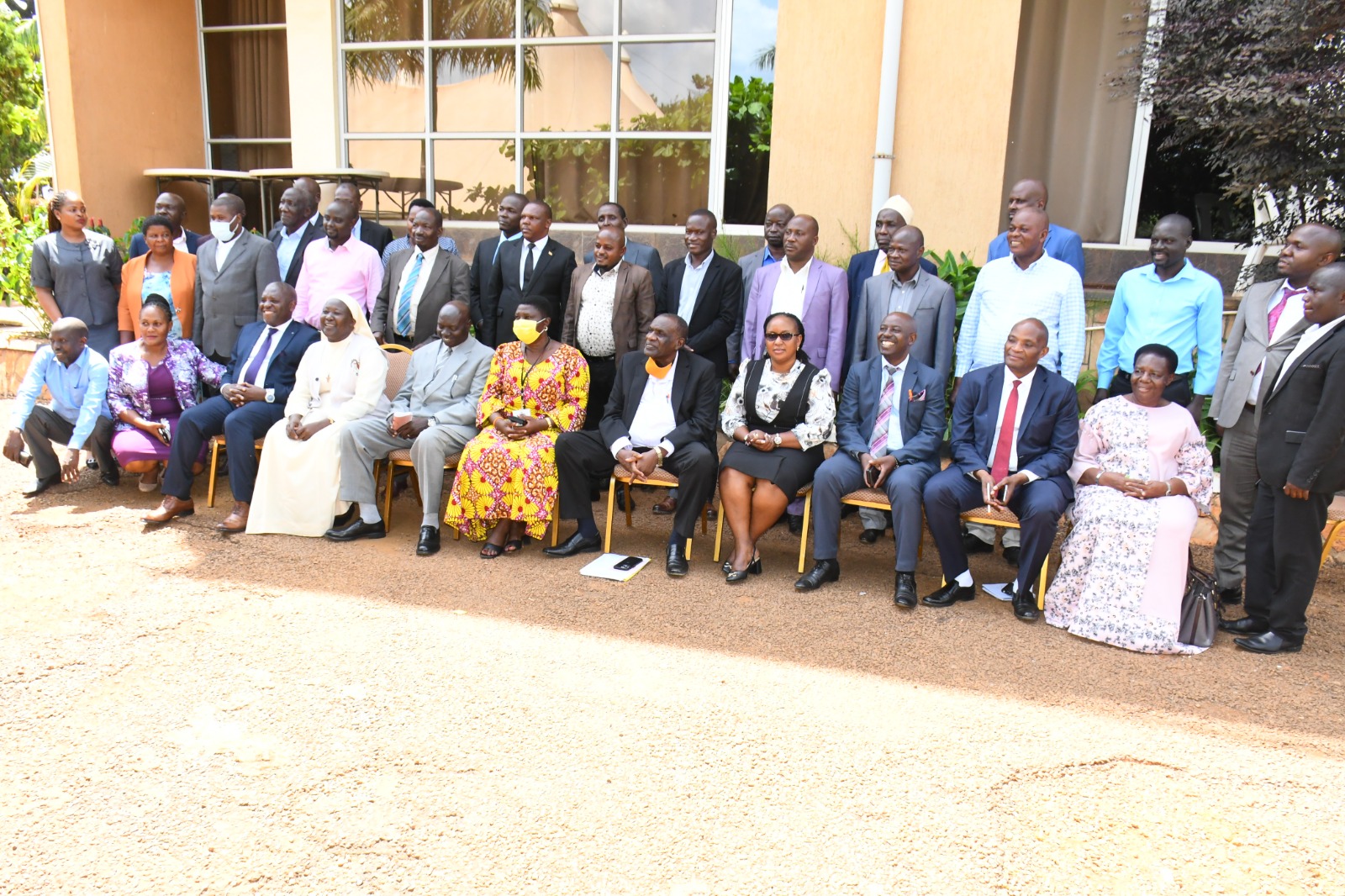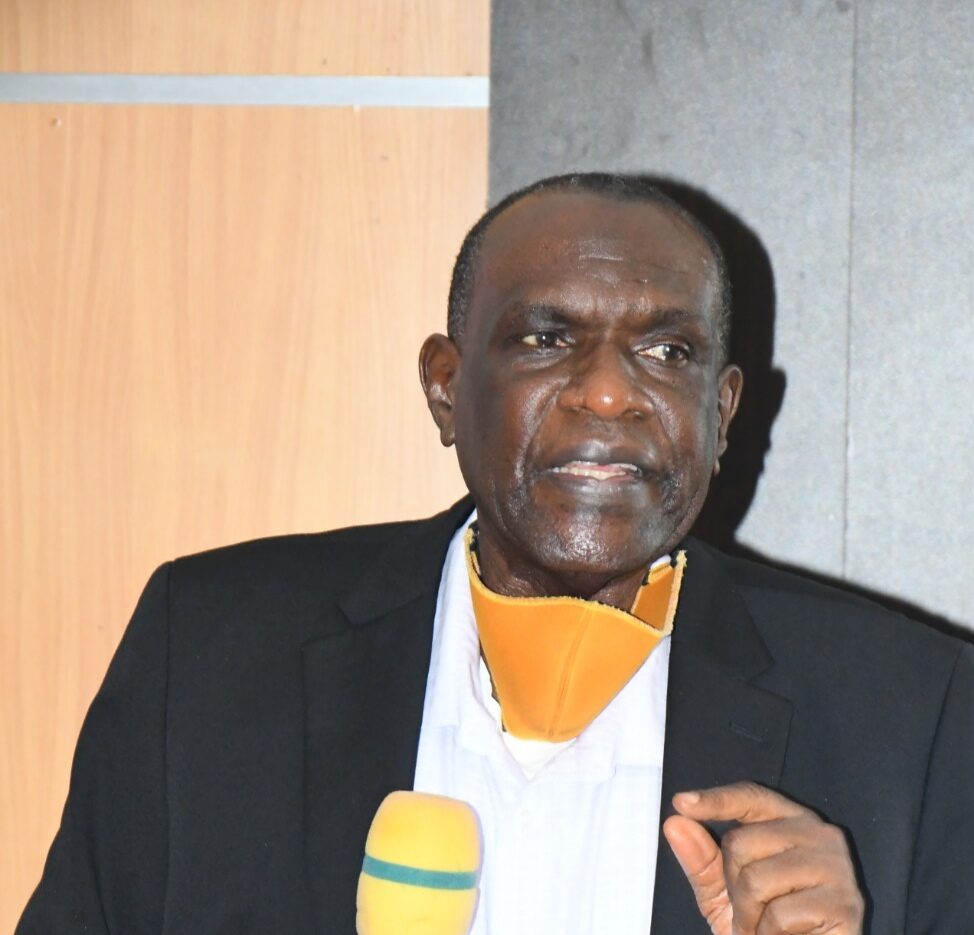The Secretary in the Office of the President, Hajji Yunus Kakande has told Resident District Commissioners(RDCs) /Resident City Commissioners (RCCs) and their deputies that they have a cardinal role to play as far as the implementation of Parish Development Model is concerned.
The model aims to lift 39 percent of households from the subsistence to money economy.
According to Hajji Kakande, the Commissioners and other stakeholders like DISOs should be at the forefront in ensuring that government programs like PDM work out since the initiative is one of the drivers of Uganda’s socio-economic transformation.
The Secretary in the Office of the President made the remarks today while delivering his keynote address at the opening of the 2-day Capacity Building Workshop for RDCs/RCCs, deputies and DISOs from Busoga Sub-region, held at the Source of the Nile Hotel in Jinja City.
“PDM is a cardinal program in the NRM Manifesto. You must be seen and ensure that the model succeeds. It is the only yardstick which we shall use to campaign for President Yoweri Museveni in the next general elections,” Hajji Kakande emphasized.
“We want by 2025 that the trillions of money we would have sent to our people have made a difference in their lives.Ensure prosperity of all Ugandans through government programs like PDM,” he added.
On the issue of abject poverty in Busoga sub-region, Hajji Kakande advised the RDCs to ensure changing the mindsets of the people in the area towards work.
“If you don’t work for yourself, poverty can kill you. You as leaders must ensure that you deal with this issue of increasing the household incomes of Ugandans. If the colonialists did it, then can you fail?” he inquired.
“With PDM, for us we tell you to work and remain with this money in your pockets, pay school fees and conduct other initiatives you can think of. This is a good intervention if it is properly handled and maintained. You should ensure that this model succeeds.”
Hajji Kakande also underscored the importance of monitoring and evaluation of government programs in service delivery, reminding the Commissioners that the component is one of their constitutional mandates as representatives of the President in their areas of jurisdiction.
“You are in charge of supervising government programs in your districts and cities and in charge of the security in your area. So this regional capacity building workshop is very crucial because it equips you with more skills that help you to execute your roles,”he said.
Hajji Kakande further urged the Commissioners to take the issue of environmental conservation seriously in order to reduce the repercussions of environmental disasters such as floods.
He also informed the audience that the President has already tasked the Minister for Presidency, Hon. Babirye Milly Babalanda to come up with a Cabinet Paper on the three (3) subregions of Busoga, Bukedi and Kigezi to see how the government can sensitize the people in those particular areas to stop encroaching on the wetlands.
“The paper is the offing and I’m sure it will guide you on what to do,” he noted.

The Secretary-Office of the President also called upon RDCs to work in unison with fellow leaders in their districts to help the government achieve its development agenda.
“… And you are in charge of security, you cannot afford to have differences with the DPC, DISOs among other security heads in the district,” he warned.
Makerere University Business School (MUBS) Don, Associate Prof. Sudi Nangoli who presented a paper on Monitoring and Evaluation of Government programs advised the commissioners to always create tangible results when monitoring government projects.
He disclosed that Monitoring and Evaluation is the most important component when handling a project.
“The quality of information you give out largely relies on the kind of Monitoring and Evaluation you do,” Associate Prof. Nangoli said.
“Monitoring information is only useful if given to the respective users or stakeholders.If you want to succeed in your Monitoring and Evaluation, know yourself; know your strengths and weaknesses,” he added.
Prof Nangoli also cautioned the RDCs against being power drunk and harassing the ordinary people, explaining that such attitude negatively affects the level of their performance.
“Don’t fall in that trap of showing power at the expense of your results.”
Ms. Jovrine Kaliisa Kyomukama, the Deputy National Coordinator- PDM urged the Commissioners to use the PDM language of pillars when sensitizing the ordinary people to embrace the program. She said, this will help Ugandans understand better how the program works.
“Take keen interest in the program. The President has been emphatic on ensuring success of the program. He has also promised to have people sabotaging PDM arrested,” Ms. Kaliisa said.
Dr Sunday Nickson, an Economist working with the PDM Secretariat told the commissioners that the model was put in place to help generate household income for poor Ugandans by lifting families from subsistence to money economy.
“Subsistence is part of poverty, if you produce only what to eat it means you are poor. Subsistence also means that somebody has energy to work but he is supported. Most of our youth have energy to work but have no jobs. People are willing to produce but they don’t have capital.That’s why PDM came in place; to give our people capital,” he said.
Dr. Sunday also said the PDM services are delivered through 7 pillars. The pillars include Agricultural value chain development, infrastructure and economic services, financial inclusion (delivery of financial services to all citizens) and social services.
Others are community mobilisation and mindset change, PDMIS (Database of household and community profiles and governance and administration.
At the same workshop, Lt Col Kibrai Ambako, the Senior Presidential Advisor on Mobilisation-RDC Secretariat asked the commissioners and DISOs to look at security issues in their areas from a strategic perspective and this will help them to defend Uganda against threats that could deter the country’s vital interests.
“The threats cut across in social, economic, environmental activities and management of resolutions. If you only look at the lawlessness or insurgency then you have missed a point,” Lt. Col Ambako said.
“Ensure that security is looked at in totality. When you see some threats coming and you fail to advise, the blame goes on you,” he added.
Lt Col. Ambako also cautioned District/City Security Committees chaired by RDCs/RCCs against writing insubstantial minutes during their meetings.
“Every month you have the same agenda and there’s nothing new to discuss. I read them. I think your Secretaries sit down and recycle minutes.Does your DSC talk about serious issues of security in the meetings?” he wondered.
“Your security committee sits even before getting facts on the ground. You should get issues from the sub-counties because they always get issues from the communities. If the sub counties give the minutes to you, those minutes should influence your agenda. And your agenda should include service delivery. You should talk about economic activities and social issues to help you monitor schools, health facilities among others.”
The Principal Human Resource Officer- Office of the President, Mr. Herbert Atuheire .B advised the commissioners to observe the Code of conduct and Ethics for the public service if they want to sustain their jobs.
He said they should do this by following the principles of code of conduct which include among others; professionalism, discipline, loyalty, selflessness, transparency, impartiality, financial credibility, efficiency and effectiveness.
The code of ethics is a basis for enforcing discipline in the public service, ensures that Public Officers perform their duties with dedication, diligence, integrity and justice. It also enables public officers to be loyal to the government and implement government policies without fear or favor,”Mr. Atuheire stated.
“It also enhances transparency and accountability in service delivery, reduces corruption and enhances performance,” he added.
Mr. Atuheire further emphasized that as Public servants, the Commissioners are required to give service to members of the general public at all times.
“A public officer therefore, holds office in public trust and is accountable to the public for both actions and inactions.”
Meanwhile, the Regional Capacity Building Workshops for RDCs/RCCs, deputies and DISOs are meant to remind the commissioners and DISOs of their core mandate of supervision, monitoring, mobilisation and effective representation of the Central Government and H.E the President.
The workshops are also aimed at refocusing the commissioners and DISOs to critical and prioritized government programs and projects where they should lead to achieve set objectives and ultimate goals as well as equipping them with more appropriate skills and tools to enhance their operation in their respective districts and cities.
The workshops are also meant to help the commissioners to share with their supervisors the challenges affecting their operations in the field.
Do you have a story in your community or an opinion to share with us: Email us at Submit an Article








